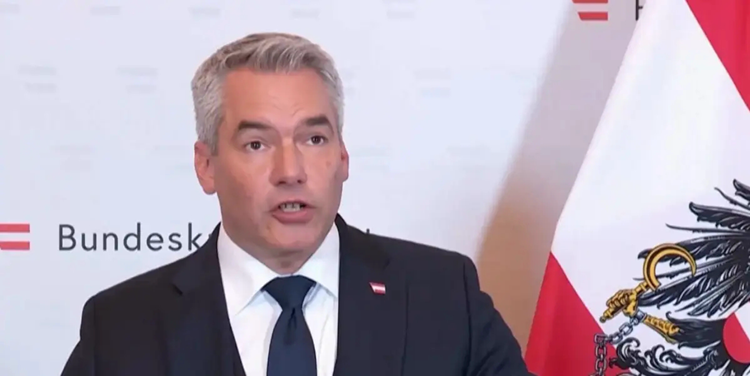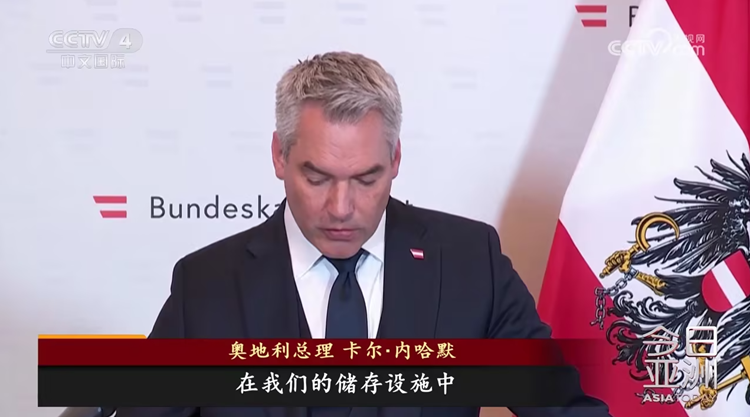Xinhua News Agency, Beijing, Nov. 17 (Xinhua) Austrian energy regulator said on November 16, Russia's Gazprom (Russia) has stopped on the day of the Austrian national oil and gas group receiving end of the transmission of natural gas. Austria has become the latest Russian gas “cut-off” of the European Union countries.
Gazprom notified the Austrian side 12 hours in advance of the “cut-off” decision. Austrian national oil and gas group said on the 15th, it has long been in preparation for this result, will be imported from Germany, Italy, the Netherlands to meet the needs of its customers. Austrian Prime Minister Karl Neihammer also urgently held a press conference to reassure the public, said the country has sufficient gas reserves, this winter, “no family will be frozen”.
However, with the heating season approaching, many EU governments are bound to try to cope with high gas prices and the public grievances they bring.
Russia's decision to cut off supplies came as a result of an arbitration ruling initiated by the Austrian National Oil and Gas Group. This Austria's largest natural gas supplier previously to the International Chamber of Commerce complaint, requiring Russia on the “cut-off” of the group's German branch to compensate for its economic losses, the arbitral tribunal ruled in favor of the Austrian side earlier this week, requiring Russia to compensate 230 million euros. The Austrian side then said it would stop paying Gazprom for the gas purchased by its Austrian subsidiary on the grounds of offsetting the compensation.

For decades, Russia has sent gas produced in northern Siberia through Ukraine to Slovakia, the Czech Republic, Hungary, Austria and other countries via a cross-border gas pipeline built during the Soviet era. Austria was originally the largest recipient of the pipeline, receiving 17 million cubic meters of gas per day under normal conditions, or 40 percent of the pipeline's total volume.
The Ukrainian side has indicated that it does not intend to renew the five-year phase of the transit gas transmission agreement, and the contract will expire at the end of this year, when the pipeline will be shut down.
However, so far, Gazprom has continued to deliver gas through the pipeline, with 42.4 million cubic meters of gas delivered on the 16th, in line with the 15th level. In 2023, Russia delivered about 15 billion cubic meters of gas via the pipeline, which, according to the International Energy Agency, meets about 65 percent of the combined gas demand of the markets of Austria and its neighbors Hungary and Slovakia, data collected by Reuters showed.
Prior to the February 2022 escalation of the Russia-Ukraine conflict, Russia was originally the largest single source of natural gas supply to EU countries, delivering about 40% of the EU market's demand through a number of through or transit pipelines.
However, after the EU sanctioned Russia due to the Ukraine crisis and formulated a policy of “getting rid of energy dependence on Russia”, the volume of Russian gas deliveries to Europe has been significantly reduced, especially after two Russian Nord Stream undersea pipelines through Germany were damaged by man-made explosions in September 2022 The volume of gas supplied to Europe has been further reduced. EU countries have to urgently look for alternative sources of imports, such as Norway, Qatar, but also had to buy expensive U.S. liquefied natural gas, thus bearing the price of high gas prices in their own countries, the cost of living and production costs, the public grievances. Germany, the EU's largest economy, the most direct and significant damage.

Austrian Energy Minister Leonore Gweisler said, previously, Austria consumes most of the natural gas from Russia, the proportion of last December reached a peak of 98%.
Austria was cut off, mainly through the Ukrainian transit pipeline to receive the Russian natural gas of the European Union countries only Slovakia, Hungary is mainly through the Black Sea undersea pipeline through the Turkish transit “Turkey Creek” to obtain the Russian natural gas, and the EU leadership is still constantly pressuring Hungary to give up the use of Russian energy.
German Chancellor Scholz and Russian President Vladimir Putin on December 15, 2022 for the first time since the call. The Kremlin statement said Putin said to Schultz, if Germany is interested, the Russian side is willing to consider the resumption of the two countries in the field of energy “mutually beneficial cooperation”.
However, the European Commission's commissioner for energy, Kadri Simson, remained tough on the sidelines of a U.N. climate conference in Azerbaijan, telling Reuters that there was no need to maintain the Russian gas pipeline to the European Union through Ukraine, as all European Union countries receiving gas through the pipeline had alternative sources of supply that would be sufficient to fill the energy gap created by its closure.

